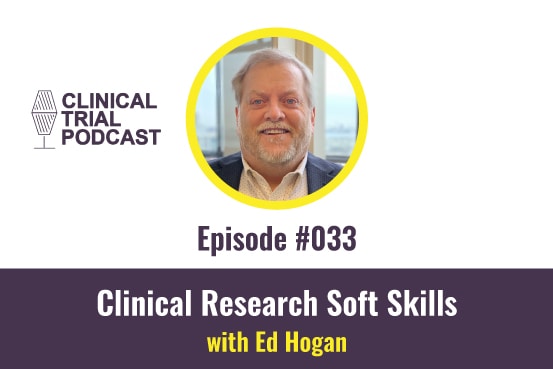Many people talk about technical skills in clinical research.
You need to know Microsoft Excel.
You need to understand Good Clinical Practice.
You need to memorize the FDA guidance documents.
Have you ever heard someone talk about soft skills in clinical research?
I realized the importance of soft skills after joining Abbott in 2007 as a Clinical Project Manager.
When you work with a diverse team, you must master soft skills.
Soft skills, also known as “real skills”, help you learn, adapt and grow.
In this interview, I invited Ed Hogan, Executive Vice President (EVP) at Invicro, to talk about soft skills in clinical research.
Ed and I first met in 2005. He was the Director for Medical Imaging at PAREXEL/ Perceptive Informatics, my first job out of college.
Ed is now responsible for overseeing the clinical services team which includes project management, imaging services, data management and reader management for early and late phase clinical trials.
Ed has close to three decades of experience in clinical research, managing, and executing Phase I through Phase IV imaging trials in both the Pharmaceutical and CRO space.
He is THE expert when it comes to medical imaging operations.
Ed has progressive business experience in building and managing global cross-functional teams supporting clinical trials focusing teams on delivery, accountability, and customer satisfaction while driving quality and process improvements.
For these reasons, I invited Ed to talk to us about soft skills including negotiating contracts, how to develop a successful manager-employee relationship, what Ed looks for when he is wanting to promote someone on his team, leading effective meetings and much more.
Sponsor
Florence Healthcare: Transform your Clinical Trials with the #1 Platform for Electronic Document Workflows and Remote Site Access.
Learn how Florence Healthcare helps over 7,200 research sites, sponsors, and CROs across 27 countries take their day back from paper.
Show Notes:
- [3:50] Soft skills and project management
- [3:50] Negotiating contracts with Sponsor including cost, study design, and operations
- [7:25] Offer Sponsors what they need and not nice-to-have elements
- [8:24] Clinical project managers are involved in finances
- [10:22] Ideally Sponsor should ideally have a direct communication with imaging CRO
- [11:59] Example of risk mitigation in clinical trials
- [13:39] Developing soft skills through PMP certification and courses and on the job training
- [14:45] Managing and working with project team members
- [17:21] Developing a strong team with diverse and complementary skills
- [19:01] Putting in time and practice to develop your skills
- [21:01] Soft skills are not easy to do
- [22:28] Key ingredients that make a successful manager-employee relationship
- [23:52] Giving direct and timely feedback
- [25:37] Feedback “shit sandwich”
- [26:32] Managers can plan and prepare before giving feedback. (a) State the outcome, (b) state the issue, (c) listen, (d) reinforce your intent to help, (e) repeat the end goal and expected outcome, (f) followup with an email
- [28:51] Practical advice on managing up
- [31:54] Giving and getting feedback from your colleagues
- [34:06] Developing writing skills
- [36:01] Understand pain points to create winning proposals
- [37:23] Finance skills such as dealing with budgets, ability to write and communicate effectively, multitasking, time management, learning styles are some of the skills Ed focuses on when promoting or hiring someone new
- [40:41] Getting your foot in the door with entry level clinical research roles
- [45:54] Dealing with emotional employees when giving feedback
Resources Mentioned:
Never Split the Difference with Chris Voss
Project Management Professional (PMP) curriculum
Radical Candor by Kim Scott
StrengthsFinder 2.0 by Gallup (Author)
The Five Dysfunctions of a Team: A Leadership Fable by Patrick Lencioni
Official Microsoft Excel Video Training
The 7 Habits of Highly Effective People by Stephen R. Covey
Harvard Business Review for managers
Atomic Habits: An Easy & Proven Way to Build Good Habits & Break Bad Ones by James Clear







